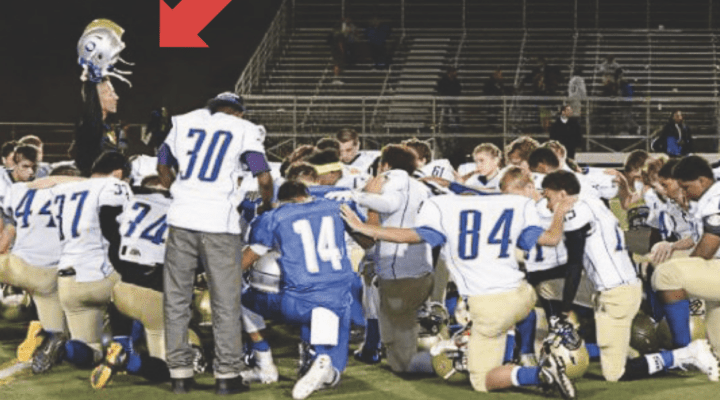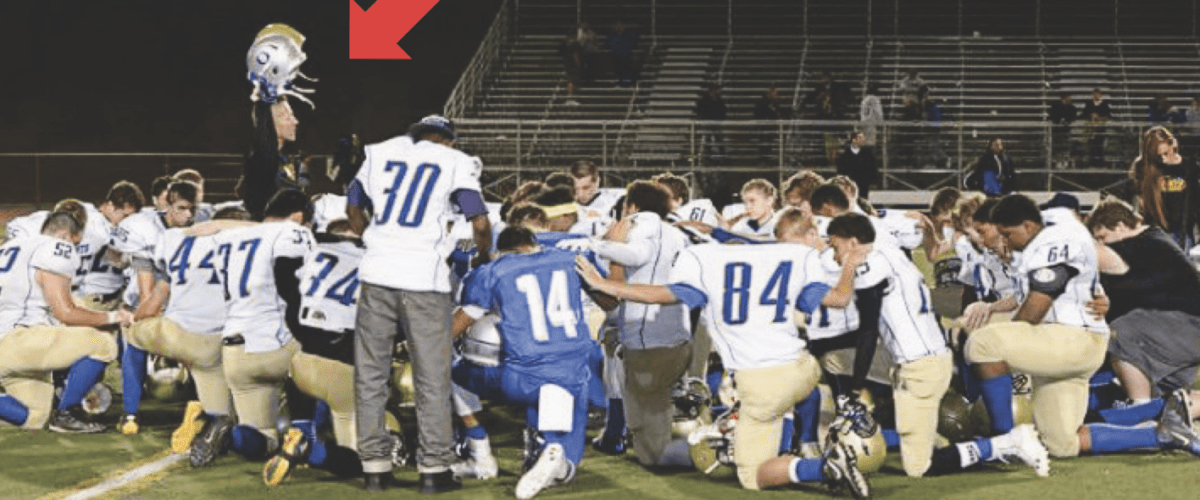A Seattle-area high school football coach has extended his religious liberty claim into unexpected overtime, with the United States Supreme Court agreeing to hear his case for a second time.
Joseph Kennedy, a former Bremerton High School coach, was placed on administrative leave in 2015 for engaging in public displays of prayer that parents and students found coercive and that the district had told him were not permissible.
The former assistant varsity football coach and head coach of the junior varsity team at Bremerton High School led public prayers with players and other students at the 50-yard line after games. Officials with Bremerton School District, a public school district outside Seattle, told Kennedy he could not continue this practice, which they learned about only after he had been doing similar things for seven years.
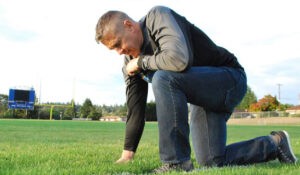
Joseph Kennedy in a photo provided by his law firm, First Liberty Institute.
Kennedy has said his religious beliefs require him to “give thanks through prayer, at the end of each game.”
“The district understood that no student-athlete should feel compelled to join a coach’s public prayers in order to be part of the team or get playing time,” said Rachel Laser, president of Americans United for Separation of Church and State, which is representing the district in court.
“When the coach refused to stop having postgame prayers on the field with students and spurned the district’s attempts to accommodate his desire to pray at work in ways that would be lawful and respect students’ religious freedom, the district placed him on paid administrative leave,” Laser asserted. “After his contract expired at the end of the season, he chose not to reapply. Instead, Kennedy and his attorneys sued, claiming that he has a right to pray on the 50-yard line immediately after the games with students.”
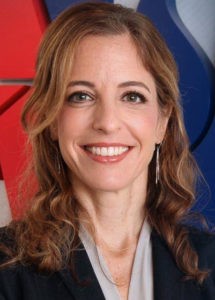
Rachel Laser
Kennedy’s initial justification for being able to engage in this sectarian practice is that once the game had ended, he was not acting as a coach but as a citizen. That defense was knocked down in earlier trials, and Kennedy later admitted he had been acting as a school employee “until the last kid leaves.”
Even after being told he must stop the practice, he continued for two more games, until the district placed him on paid leave. District officials had told Kennedy he could give inspirational talks to team members before and after games but could not lead or encourage student prayers. The district also offered other means for Kennedy to engage in private prayer before or after games, which he declined.
The case, Kennedy v. Bremerton School District, has repeatedly been decided in favor of the district but made it to the Supreme Court in 2019 as the coach appealed lower-court rulings. Along the way, he and the case have garnered attention of religious conservatives, who believe Kennedy was denied the freedom to practice his Christian faith.
In 2019, the high court denied Kennedy’s appeal, but four of the court’s conservative justices wrote that a lower court’s ruling in favor of the school was “troubling” and that Kennedy’s claims “may justify review in the future.” The case was sent back to lower courts to once again determine if the coach had been let go because of a legitimate religious expression.
Thus, the U.S. Court of Appeals for the 9th Circuit in San Francisco ruled again in the district’s favor in 2021, and Kennedy has appealed again. That is how his case has ended up back on the Supreme Court docket.
Legal briefs in the case read like creative writing exercises more than staid legalese.
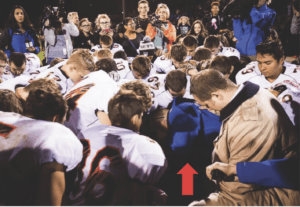
The red arrow shows Joseph Kennedy in the middle of a prayer huddle after a Bremerton High School football game, as his case was gaining media attention.
Kennedy, for example, asserts that the case is about whether a school district may prevent its employees from ever offering a “solitary,” “silent or quiet prayer” while at work. Yet the district has provided photographs of Kennedy gathering large numbers of people around him at the 50-yard-line while holding up players’ helmets and leading a very vocal and very public prayer.
Kennedy’s appeal to the Supreme Court asserts that the lower court of appeals’ decision is “stunning,” “staggering,” “radical,” “indefensible,” “egregiously” and “exceptionally wrong” and a “triple threat” and “outlier” that “obliterated” “three separate lines of First Amendment jurisprudence in one fell swoop.”
The district’s response states that “no amount of purple prose can change that petitioner’s conduct was never as the petition describes it; the school district never imposed the restrictions that the petition asserts; and the court of appeals never addressed the grand questions of legal doctrine that the petition insists — much less did it repudiate all existing First Amendment jurisprudence.”
Further, the district’s brief reports that “the prayer practice he wanted to continue hadn’t been private at all. He held more postgame prayers on the 50-yard line, with students and community members rushing the field to join him, knocking over members of the marching band.”
“He held more postgame prayers on the 50-yard line, with students and community members rushing the field to join him, knocking over members of the marching band.”
Also, once Kennedy went on local television to make the claim that he was being persecuted for his Christian faith, other groups — including Satanists — asserted to school officials that they should have the same rights as Kennedy to rush the field and engage in public displays of their own.
The district said it feared a melee on the football field.
Also, the district heard from parents who said their children felt compelled to participate in the prayers.
Nevertheless, Kennedy continues to insist he is the victim. And now he asserts that the appeals court misread the Supreme Court’s earlier instructions because it “doubled down” on “troubling government speech” and reached the “stunning conclusion” that the district had a Constitutional duty to prohibit the coach’s public prayers.
While the facts of this case in prior years likely would have prohibited the high court from taking a second look, the current conservative majority has been more inclined than ever to favor free exercise of religion demands over the Constitutional prohibition on an establishment of religion.
Laser of Americans United said: “No child attending public school should have to pray to play school sports. No student should ever be made to feel excluded — whether it’s in the classroom or on the football field — because they don’t share the religious beliefs of their coaches, teachers or fellow students.
“This case is not about a school employee praying silently during a private religious devotion.”
“We urge the Supreme Court not to fall for what a Ninth Circuit judge has called the ‘deceitful narrative’ that the coach’s attorneys have presented. This case is not about a school employee praying silently during a private religious devotion. Rather, this case is about protecting impressionable students who felt pressured by their coach to participate repeatedly in public prayer, and a public school district that did right by its students and families.”
Kennedy is represented by First Liberty Institute, a Texas-based firm specializing in conservative causes and a frequent litigant on free expression cases. In its appeal to the high court, First Liberty begins with the assertion that “Kennedy lost his job as a football coach at a public high school because he knelt and said a quiet prayer by himself at midfield after the game ended.”
In July 2021, when Kennedy pressed the 9th Circuit appeals court for a full-court review of his case, one dissenting judge, Ryan Nelson, said in Kennedy’s defense that “merely allowing religion to be independently expressed in a school setting was never and is not an establishment of religion.”
But another judge, Milan Smith Jr., returned to the theme that what Kennedy did and wants to still do is to engage in a highly public display of religious practice.
“I personally find it more than a little ironic that Kennedy’s ‘everybody watch me pray’ staged public prayers (that spawned this multiyear litigation) so clearly flout the instructions found in the Sermon on the Mount on the appropriate way to pray,” he wrote.
Related articles:
Supreme Court opens new chapter of state funding for religious schools
Justices appear skeptical of Boston’s reasons for excluding Christian flag

